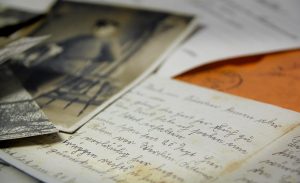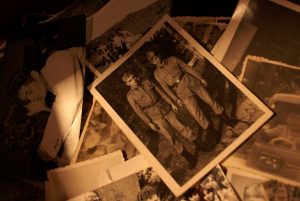 One of the biggest fears that we have when we lose someone close to us is that, as time goes on, we will forget who they were.
One of the biggest fears that we have when we lose someone close to us is that, as time goes on, we will forget who they were.
Important aspects of their personality that made them who they are, important events that happened in their lives, and just the simple things that gave them enjoyment can all slip from our memory as we age.
Not only do we often want to keep these memories for ourselves, but also for the next generation and those who never had the chance to meet the person we cared for so dearly. This can be a particular worry for younger children who can lose memories easily and may otherwise never get to appreciate the character and personality of a loved one who has passed away.
Memory boxes serve as a simple way to remember your loved one, and to add detail beyond the surface of what can just be viewed in a photograph.
What is a memory box?
 A memory box is a simple container which holds important objects that remind you of the person you have lost. The container itself can be whatever you would like it to be, from a modest shoebox to an ornate wooden trunk. What is contained in the box is far more important than how the objects are stored.
A memory box is a simple container which holds important objects that remind you of the person you have lost. The container itself can be whatever you would like it to be, from a modest shoebox to an ornate wooden trunk. What is contained in the box is far more important than how the objects are stored.
Typically, when a loved one dies we will hold on to photographs, perhaps a few pieces of jewelry and maybe larger objects like furniture. However, it’s often the smaller, seemingly insignificant objects which can provide the most insight into who a person was, what they stood for and what happened to them during their life.
What goes in to a memory box?
A memory box can contain anything that you want it to, but these are some of the common things that people choose to include:
- Photographs (portraits, special events like weddings and birthdays, or days out to the beach, etc.)
- Items of jewelry like rings, earrings, necklaces, tie pins, cufflinks, etc.
- Aftershave or perfume bottles of a scent that they often wore
- Newspaper clippings, birth or marriage certificates, educational awards, etc.
- CD’s, DVD’s, vinyl or cassette tapes that a loved one treasured
- Their favourite book or poem
- Personal letters, drawings or artwork
- A favoured item of clothing
- Plane tickets, train tickets or tickets to special events (live concerts, live sports, etc.)
There is no limit to what you can include in a memory box; anything that will help to remind you of your loved one can go inside. If you have children or a large family it can sometimes be a good idea to allow them to share the curation of the box. Allowing everybody to select one or two items that hold special memories will help make sure that nothing important is missed and that everyone can benefit from the memory box when they need to use it.
Making your own memory box
 In some circumstances you may also choose to prepare your own memory box. Perhaps in preparation for a long time in the future, or because you know that you are ill and want to plan ahead. In this case, a memory box can be a very therapeutic experience and provide you with closure that your family and loved ones will be able to have accurate memories of you long after you are gone.
In some circumstances you may also choose to prepare your own memory box. Perhaps in preparation for a long time in the future, or because you know that you are ill and want to plan ahead. In this case, a memory box can be a very therapeutic experience and provide you with closure that your family and loved ones will be able to have accurate memories of you long after you are gone.
When making your own memory box you should treat it in the same way as if you were making one for someone else. Consider the important events of your life, your hobbies and skills, things that you are proud to have achieved, and what makes you, you.
Memory boxes are quite similar to legacy letters – which we wrote about in an earlier blog here. They are sometimes known as an ‘ethical will’ or an ‘ending note’ and serve to document your values, achievements and regrets for future generations in the form of a letter, document, or video.
Supporting children with a memory box
 Memory boxes can be an important tool for any of your loved ones to remember you, but for children they can be particularly important. Children can easily lose their early memories, and a box can really help to keep their connections strong. Having a bottle of aftershave or perfume can allow the child to spray your scent on their favourite toy, which they can sniff when they are feeling sad for instance.
Memory boxes can be an important tool for any of your loved ones to remember you, but for children they can be particularly important. Children can easily lose their early memories, and a box can really help to keep their connections strong. Having a bottle of aftershave or perfume can allow the child to spray your scent on their favourite toy, which they can sniff when they are feeling sad for instance.
You could also attach notes or labels to specific items which detail the significance of an item. This can help children to build up a story of your life, long after you have gone, and their memories have begun to fade. Your box of memories can be a source of enormous emotion for your child throughout their life, and it may at times be upsetting for them to look through. You may decide that you want to give one of your relatives or close friends responsibility for the box, so that you know that someone is there to comfort your child whenever they look through it.
Modern memory boxes
In today’s world, large parts of our lives and our memories are digitized online. Many of the activities that we take part in are recorded with photographs on social media websites like Facebook. If you are tech savvy, then you might find it easier to create a memory box digitally using an online storage system like Dropbox or Google Drive. Alternatively, you might want to save your photographs, music and videos on a storage device like a USB stick or hard drive. This can expand the amount of information that you can keep; for instance you could save your entire music collection for your children or loved ones to work their way through.
Should anything be omitted?
A commonly asked question is whether bad memories should be included in the box. If you, or your loved one had an illness or endured other hardships you might not want to include them in the box. This is your choice entirely; however, it is perfectly fine to include them if you want to as they may help to give a more accurate representation of your life, or that of your loved one.
Final thoughts
While the process of preparing a memory box can be upsetting, it can also be comforting to know that your loved ones will have strong memories of you and be able to pass on the stories and lessons of your life. You might even find that you want to prepare your memory box with your friends and family as an activity recounting stories together.
For help and advice on funeral plans please contact us on 0151 228 3900, or leave us a message through our contact us page by clicking here.
Download article as a PDF
